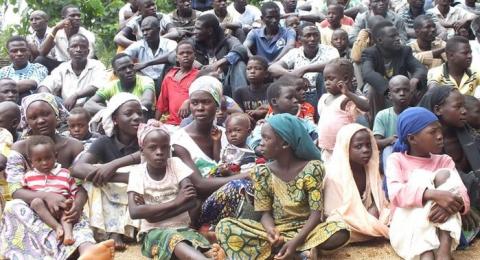
Mrs. Aisha Musa, one of the parents, said for the past one year, children and adults in the camp have been struggling to survive, with little or no assistance from all quarters.

Children taking shelter at a camp for Internally Displaced Persons (IDP), located about two kilometres from Rindebin community in Bauchi Local Government Area, have resorted to feeding on onion leaves to survive.
Aged between three and five years old, the children, who showed signs of malnutrition, have resorted to feeding on the leaves as a result of inadequate provision of food items at the camp.
Speaking with NAN correspondents, who visited the camp, some of their parents said there wasn't enough food, and as such, they had to "improvise" ways of tackling hunger.
According to the parents, onion leaves are nutritious and would also protect their children from hunger and diseases.
Mrs. Aisha Musa, one of the parents, said for the past one year, children and adults in the camp have been struggling to survive, with little or no assistance from all quarters.
Another parent, Mrs. Ajidda Ahmed, lamented the hardship faced by the IDPs, stating that: “Both adults and children suffer from hunger; this has resulted in forcing us to eat raw onion leaves from sellers that come to the camp.
“Rainy season is about to set in and another fear is the outbreak of childhood diseases, because for the past one year, our children were not immunised and there are no water, sanitation and hygiene facilities.
“We defecate in the bushes and the rain water will soon wash our faeces back to the stream, where we source for water to drink."
Bulama Gojja, leader of the camp, said they are more than 200 in number of the Shuwa-Arab stock from Marte, Marfa and Jere local governments of Borno State, and that they were forced to relocate to the camp last year as a result of the activities of Boko Haram insurgents.
According to Gojja, their challenges include insufficiency of food items, lack of potable water, health facility and education for their children. He said in 2018, no fewer than 20 pregnant women delivered in the camp without the required medical attention, expressing fears that the offspring might develop health challenges due to lack of immunization.
He appealed to government and non-governmental organizations for assistance.
Attempts to get the comments of those in charge of ensuring provision of facilities and items at the camp were not successful as they were not on seat each time NAN visited to make enquiries.